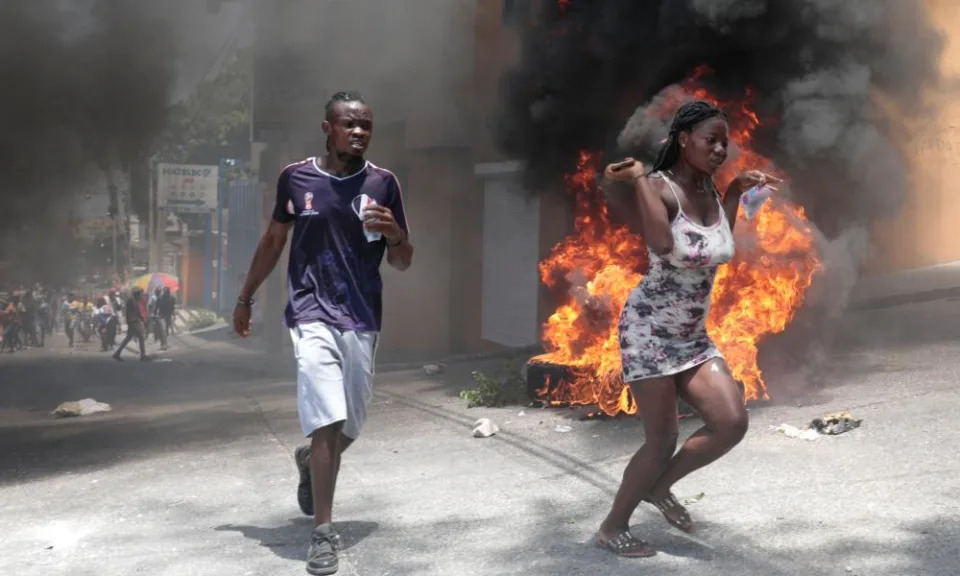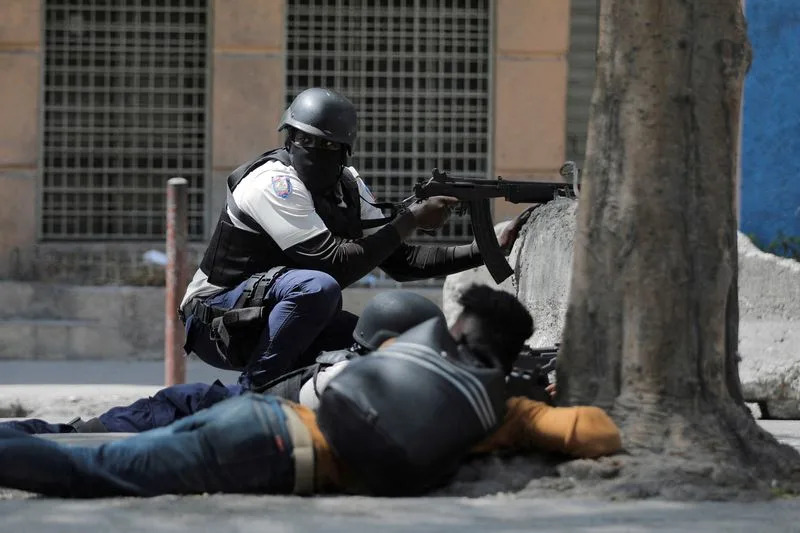NEWS WIRES
Mon, 14 August 2023

© Richard Pierrin, AFP
A human rights group urged the international community on Monday to intervene quickly to end spiraling violence by gangs in Haiti as it detailed the brutal rapes and killings committed in the troubled nation's capital.
The call by Human Rights Watch comes as Haiti awaits a response from the U.N. Security Council to its request in October for the immediate deployment of an international armed force to fight the surge in violence.
“The longer that we wait and don’t have this response, we’re going to see more Haitians being killed, raped and kidnapped, and more people suffering without enough to eat,” said Ida Sawyer, the group’s crisis and conflict director, who visited Haiti to compile a report on the violence.
The U.S. said earlier this month that it would introduce a U.N. Security Council resolution authorizing Kenya to lead a multinational police force to fight gangs in Haiti. However, no timetable for such a resolution was given.
“The main message we want to get across is that Haitian people need support now,” Sawyer said. “We heard again and again that the situation is worse now in Haiti than it’s been at any time people can remember.”
Gangs have overpowered police, with experts estimating they now control some 80% of Port-au-Prince. There are only about 10,000 police officers for the country's more than 11 million people. More than 30 officers were killed from January to June, and more than 400 police facilities are inoperative because of criminal attacks, according to Human Rights Watch.
Luke Taylor
Mon, 14 August 2023

Photograph: Odelyn Joseph/AP
Human rights abuses in Haiti are soaring while the Haitian state is almost nonexistent and unable to protect its people from the brutality of armed gangs, Human Rights Watch has warned in a new report.
Rival criminal factions now have such a tight grip over the country that international security forces could be necessary to restore order, the rights groups said.
HRW investigators documented 67 recent killings by armed gangs in its report, “Living a Nightmare” including the murders of 11 children and 12 women. It also verified more than 20 cases of rape – many of them committed by multiple perpetrators to sow terror among the population.
“Urgent action is needed to address the extreme levels of violence and the palpable fear, hunger, and sense of abandonment that so many Haitians experience today,” said Nathalye Cotrino, crisis and conflict researcher at HRW.
Haiti has fallen into chaos since president Jovenel Moïse was assassinated in 2021 and gangs began grabbing control of the country in bloody turf wars.
Harrowing human rights violations have become commonplace, 4.9 million people cannot regularly get enough food to eat, and cholera has returned amid the conflict.
Criminal groups have killed at least 2,000 people and kidnapped more than 1,000 in the first half of 2023, according to the UN.
The explosion of violence is being driven by around 150 gangs who are vying for control of the capital, Port-au-Prince.
The government response to the conflict has been “weak to non-existent”, HRW said, in part as the police and the government have affiliations with the criminals, who receive a steady flow of arms and ammunition from Florida.
“Based on available information, there have been no prosecutions or convictions of those responsible for killings, kidnappings, and sexual violence, or their supporters, since the start of 2023,” HRW said in the report.
The rights body verified accounts of gruesome killings in its interviews, the use of sexual violence as a weapon, and the practice of dismembering of bodies with machetes and setting corpses alight to intimidate rivals.
“They rape us because they are in control, because they have guns, because there is nobody to defend us. There is no police or state,” a survivor of sexual violence in the sprawling Port-au-Prince slum Cité Soleil told the rights body.
Most of the gangs are affiliated to either the G-Pèp federation or the rival G9 alliance. A recent push by the G9, led by the notorious warlord “Barbecue”, into the G-Pep stronghold of Brooklyn in Cité Soleil has caused the violence to flare.
The rivals called a truce in late June but the ceasefire is flimsy and the two groups continue to abuse local populations.
The police’s inability to fight back means a growing number of Haitians are turning to vigilante groups for protection. Vigilantes, sometimes co-operating with police, have killed more than 200 suspected criminal members as of June, HRW said.
The 97-page report comes days before the UN secretary general, António Guterres, is expected to propose a plan to deploy international peacekeeping forces to Haiti.
Ariel Henry, who became interim leader following Moïse’s assassination, requested assistance from the UN in October last year to restore order. The Henry government has failed to hold elections and now has no single elected official in office.
Kenya proposed leading a taskforce earlier this month with the backing of the US and Canada, though civil society groups raised concerns over the human rights record of police in the east African country.
Nearly all of the civil society representatives interviewed by HRW said the situation is so dire that international forces are now necessary to push back the gangs.
Sarah Morland
Sun, August 13, 2023

FILE PHOTO: Gang violence in Port-au-Prince
(Reuters) - International security assistance for Haiti's police should include safeguards to prevent abuses, Human Rights Watch (HRW) said, as debate intensifies over a Kenya-led force to help stem worsening gang violence.
Haiti's unelected government requested urgent help last October as heavily-armed gangs expanded their control over large parts of the country, driving a humanitarian crisis amid bloody turf wars that have displaced some 200,000 people.
Wary of supporting a government many Haitians consider corrupt, no country answered the call for a foreign security force until Kenya stepped forward last month.
A U.N. report is due this week, after which the plan, with U.S. backing, will pass to a Security Council vote.
In a report published on Monday, HRW said it had interviewed 127 people in Haiti. Many reported widespread sexual violence and a lack of basic needs.
"I want the international community to bring peace if they can," 42-year-old mother Rosie told HRW researchers in a report. "There's no water, no electricity, no food, no peace."
The researchers noted that most people interviewed supported an international force helping police, though safeguards are needed, such as monthly U.N. situation reports, independent abuse oversight and investigation bodies.
It also urged the neighboring Dominican Republic and United States to stop deporting migrants back to Haiti.
Past U.N. peacekeeping missions left behind a cholera epidemic that killed over 10,000 and over a hundred allegations of sexual abuse of women and children. There have been no reparations.
UNDER GANG CONTROL
HRW documented dozens of cases of rape - often collective - but said these are vastly under-reported due to fear of reprisals and lack of trust in authorities. Most victims it spoke to had not received medical attention.
The government has said it has helped thousands of rape victims through support such as legal certificates, medical aid and emergency contraception, but local rights groups say the state has been paralysed and impunity is normalised.
"The rapes and killings happen every day at Deye Mi," said 34-year-old Anne, whose Port-au-Prince neighborhood has been besieged by the powerful G9 Alliance fighting rival G-Pep gang.
"There's only one road into the area, and there's a pile of bodies there," added Natalie, 42. She said she was raped on her way home from the market and her 16-year-old son was killed days later while coming home from school.
A humanitarian officer told HRW sexual violence had become usual practice in gang-controlled areas "simply because they have the power to do so".
Fighting has also moved to farmlands as many suppliers are unable to move food across the country.
The U.N. ranks Haiti alongside Yemen and Somalia as the countries most at risk of communities entering starvation.
HRW said a multinational force should secure access to roads, ports and hospitals so food, aid and people can move.
"We can't run from one place to another all the time to flee these attacks," said Quentin, 30, left homeless after an attack on his neighborhood. "If the situation continues like this, it's like we're already dead."
(Reporting by Sarah Morland)
No comments:
Post a Comment